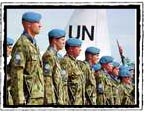UN soldiers boost south Lebanon's economy at Christmas
 Tyre, Lebanon - Southern Lebanon suffered great losses during the Hezbollah-Israel war in 2006, but a "blessing" has landed in the area this Christmas season to save the economy with a boom in sales in the form of UN peacekeeping troops.
Tyre, Lebanon - Southern Lebanon suffered great losses during the Hezbollah-Israel war in 2006, but a "blessing" has landed in the area this Christmas season to save the economy with a boom in sales in the form of UN peacekeeping troops.
"The UNIFIL (United Nations Interim Forces in southern Lebanon) is a blessing: most of our business this holiday season depends on them," said Ali Zeidan, a souvenir store owner in the southern port city of Tyre.
Following the July-August 2006 war which devastated the region, the UN Security Council boosted the number of UNIFIL troops to 13,500 - from only 2,000. The force has been in the region since 1978.
"Usually before the Christmas season most of the peacekeepers go home for the holidays, so they buy lots of souvenir gifts from us," he continued.
"The market is booming at this time of the year," he said.
"The funds available to UNIFIL and also to humanitarian organizations based in southern Lebanon have created an economic effervescence," a banker in the same city said.
"Financial transactions have increased by 50 per cent since 2006 in the south," he added.
According to local vendors, UNIFIL troops spent more than 40 million dollars this year to buy fuel, food, mineral water, construction material, stationery and office supplies from local businesses, as well as souvenirs and pirated DVDs.
A jewelry shop vendor near the Naqoura UN headquarters in southern Lebanon said her sales grew up to 80 per cent this Christmas season from the gold gifts UNIFIL troops bought.
"The peacekeepers like to buy gold gifts from Lebanon for their wives, fiances and girlfriends during the holiday seasons," Nour Abdallah said.
"They told me it is cheaper to buy gold gifts from Lebanon than in Europe," she added.
For most shop owners in southern Lebanon, the UNIFIL troops were the main source of their income this year.
"Tourism to this area is not our main source of income like the rest of Lebanon, but our tourism season depends on the peacekeepers at this time of the year," Abdallah said.
"Since the 2006 war, Arab tourists, who usually come to Lebanon to spend money, have stayed away from our southern region?" said Ali Chaabaan, a restaurant owner in Tyre.
Ali stressed that the tourism industry in southern Lebanon had been reeling since the February 2005 assassination of former prime minister Rafik Hariri and Israel's war on Hezbollah in the summer 2006.
"Tourists like to go to areas in Lebanon which are safe and they do not come to southern Lebanon for fear that any small security problem between Lebanon and Israel might develop into a war," he added. (dpa)